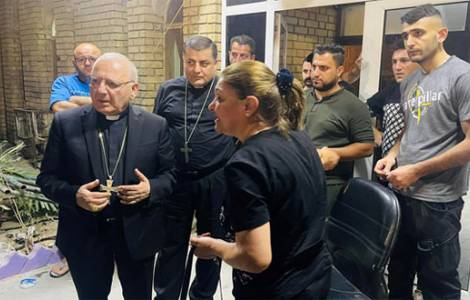
SaintAdday
Baghdad (Agenzia Fides) - In 2014 they had to flee Mosul and the cities of the Nineveh Plains in northern Iraq. They had abandoned their homes and all their belongings in the face of the advance of so-called Islamic State (IS) militias, they finally found refuge in Baghdad in and around a building in the Zayouna district, now known as the "Virgin Mary" Refugee Camp. Now they have to give way to the commercial interests of entrepreneurs and the Iraqi capital's urban development plans and leave their already precarious living quarters. Over the past few days, more than 120 Christian families have been asked to move out of the building complex in which they are housed. A corresponding order was previously issued by the Directorate of Investments in Baghdad. A new shopping center is to be built in the area.
In recent days, Chaldean Patriarch Louis Raphael Sako (in the photo) had visited the complex, which was named after the "Virgin Mary", to express his solidarity with the people staying in the refugee shelters on land owned by the state to express and speak to displaced families about their concerns. With the new school year that has just begun and winter approaching, the Iraqi Cardinal turned to the political authorities, according to the Chaldean Patriarchate, "to postpone the evacuation for at least a year or to find a reasonable alternative to house these families".
On October 13, a year after the last general election, the Iraqi parliament elected 78-year-old Kurd Abdel Latif Rashid as president. Rashid received 162 votes against 99 that went to outgoing Barham Saleh. Immediately after his election, the newly elected president commissioned Mohammed Shia' Soudany to form a government. Rashid, candidate of the Patriotic Union of Kurdistan, was born in Sulaymaniyah. Previously he was Minister for Water Supply. The prime minister appointed by him is a representative of the pro-Iranian wing of Iraq's Shiite parties. In the long post-election political stalemate, tensions between supporters of the Shiite Imam Mouqtada Sadr - at the head of the coalition that won the most seats in parliament - and militiamen from the pro-Iranian parties had brought Iraq to the brink of civil war. (GV) (Agenzia Fides, 15/10/2022)
 ASIA/LEBANON - General Abagnara (UNIFIL): “The Pope’s visit confirms us in our peacekeeping mission”
ASIA/LEBANON - General Abagnara (UNIFIL): “The Pope’s visit confirms us in our peacekeeping mission”